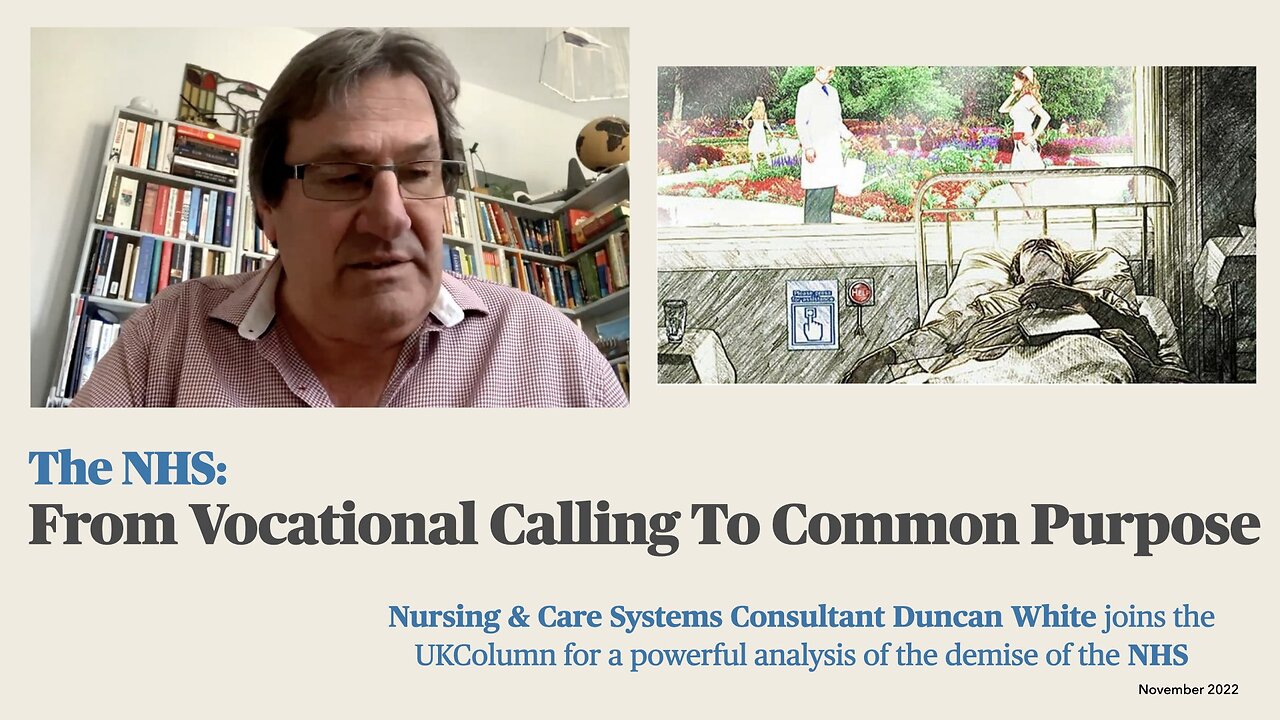Premium Only Content

The NHS: From Vocational Calling to Common Purpose
Duncan White is a former Registered Nurse in mental health and acute services. He worked his way up to executive level in acute medicine and psychiatry before joining a private enterprise rescuing bankrupt nursing homes and turning around failing homes. He then embarked on a career with a City of London consultancy working in healthcare systems across the UK, as well as participating in six overseas projects, including spending two years in the Gulf states.
On his return, he worked as an advisor in home care services for a trade association, and interfaced in working groups with the Department of Health and the Department of Business, Enterprise, Innovation and Skills. He worked on subjects such as implementing the Care Act and the Modern Slavery Act. He also worked with the Care Quality Commission, Skills for Care, and other project groups that gave him a good understanding of how the bureaucracy behind the healthcare system really works.
On top of all this experience, he has also been working with charities. During his extensive career, Duncan was commissioned into the Royal Army Medical Corps as a Nursing Officer, and spent twelve years in forward-operating roles working with the Infantry and the Tank Regiment. He was based in front-line formations in Germany, the Netherlands and Cyprus.
Duncan reveals that he was introduced to the UK Column by colleagues and subsequently signed up as a UK Column member.
Politicised healthcare
Beginning with an anecdotal story about meetings and ensuing breakdown in the National Health Service, Brian and Duncan discuss the NHS across many different areas. These include targets being set which do not meet clinical needs; healthcare promotion; and conflict within decision making. As an example, Duncan explains that several years ago, he and others were asked to make a decision on a project and were given no time to do it. The push was for a rushed decision and plan, something that he says would never happen in (for instance) the car industry, where a full-concept feasibility study and marketing strategy would be essential.
In contrast to that measured commercial approach, he highlights that the NHS would simply forget whether the proposed idea was matched to needs or to a real health problem. He comments that CEOs of NHS Trusts (the local NHS bodies) have "gravestones in their eyes" because of the pressure put on them to implement initiatives in this way. He feels that the CEOs are in the hands of a bureaucratic machine that simply dictates policy at any cost.
Duncan's analysis of the NHS identifies that demand failure ultimately leads to politicisation of the NHS. He adds that large organisations such as the NHS become very susceptible to turf wars. In the NHS, no one person has the answer to anything; therefore, at every turn you are referred on to someone else, or another department, for an answer—an answer that is often not forthcoming. Significantly, NHS staff time is swallowed up trying to solve this tail-chasing problem. Instead of working along a straight path of clinical treatment, he assesses that NHS staff spend 80% of their time trying to solve the problems in the system, rather than dealing with the patients themselves.
He defines the NHS ethos as politicisation, turf wars and silos. Problems are discharged to other departments, producing a fake functionality. As he has experienced in person, individuals who come back to the UK as a nurse or a doctor from working overseas can see see this silo thinking and the confrontational stance between professionals. NHS people defend their own patch and the patient is at the bottom of the pile.
The NHS budget is some £120 billion per year and its workforce is circa 1.4 million; the fifth largest in the world. There are also some 1.7 million working in Britain's wider care system. NHS England was established as a controlling parent body to make the NHS system more lean and responsive—but, far from being entrepreneurial, it is another bureaucracy of 14,000 people. Rumours are now circulating that Whitehall may have to take the NHS as a whole and NHS England under the control of the Secretary for State for Health and Social Care, yet the reality is that the NHS bureaucracy just keeps developing, particularly as it reacts to every stroke of the ministerial pen.
Duncan identifies that experience in other countries can highlight troubles in the NHS. Something in a healthcare system abroad may have been working well, but if the NHS attempts to adopt that same success, "five gold stars" are bolted on. This NHS "improvement" invariably detracts from the efficacy of the imported idea, leading to further complications and replicating failure.
Private healthcare
With respect to privatisation, Brian points out that UK Column held a conference on the NHS at Nottingham in 2018, Dying for Good Health, with a range of speakers of differing professional backgrounds within the NHS behemoth. Privatisation was seen by many of the speakers as an attack on the bureaucracy of the NHS. Duncan explains that many NHS services have been contracted out and that those contract tenders went out both to the NHS and private organisations. He stresses that the most economically advantageous tenders were always submitted by the private sector.
Duncan states:
You cannot create an entrepreneurial organisation from a stodgy bureaucracy. Innovative, creative solutions are needed. We don't need to privatise the NHS, We need NHS denationalised—taken out of the hands of politicians and national targets, medical protocols, et cetera. You need to remove this massive blockage and unchain the professional energy within the NHS. We need to let local authorities and agencies flourish.
Doctors who complain about the NHS being privatised also work in private hospitals. We need to face the fact that the NHS cannot carry on like this, with a false narrative. We need to create something better and different. We need to create quality assurance driven by contract, and we need private enterprise that is owned by the public and guided by local authorities.
Brian highlights the British healthcare system in years gone by, where the doctor would travel to the patient's home and be paid directly by the patient. In addition, local hospitals and cottage hospitals provided simple medical treatment and aftercare following an operation. Healthcare was centred around these units, which were all at a local level. This is in stark contrast to the contemporary supersized hospitals covering whole conurbations and the counties around them.
Duncan emphasises that Britain needs "step-down" facilities for patients recovering from treatment. He adds that he once had to decommission a community hospital. This was a very sad experience, as the hospital was an excellent, pristine facility, with a league of supporters and with money coming in. He believes that we also need step-down facilities to move patients out of the medical and into the therapeutic area of influence.
GPs are divorced from the wider NHS, working in private businesses, but NHS GPs become bored in post after their seventh year and it is better to integrate them into the wider NHS specialist clinical team. They could then integrate the hospital and primary care into a seamless service, one in which experts flow between the two. The lack of this flexibility wrecks the clinical pathway, service line management, and raises costs in budgets, as well as hobbling patient care.
He recalls that he personally made the suggestion to use such step-down facilities as a halfway house between the NHS and nursing homes, so that convalescents could move out of clinical settings and be eased into a more sympathetic care environment. His experience was that he came up against NHS Hospital Trust entrenched interests in doing so. Put simply, hospitals obtain their money in different ways, and they questioned how they would get "their" money for those step-down facilities if they were separate entities.
Their mentality was that either they, the hospitals, would manage to keep charge of a patient or another organisation would deprive them: "In general, the NHS won't hear of it." It is the managers of those Trusts who want to consolidate Britain's provision into large hospitals. It is they who say that small hospitals cannot keep doctors and nurses at professional levels. So Britain has a huge industry around the running of big hospitals. In contrast, France and Germany have smaller hospitals which can accommodate sub-acute patients.
Professionalised health management
Duncan and Brian discuss the problem of the rise of a professional class of postgraduate-trained NHS CEOs earning big money. These individuals will not give up their salary or job without a fight. They will defend their patch at all costs. Yet many of these CEOs are simply not the type of people who want to care for patients: "these new managers were coming in on the idea of big business and big money". Duncan outlines problems that he has seen with these types of people; many did not last long before others had to sort out the mess they left behind them.
He explains that people who have no clinical background take an inordinate amount of time to settle in and understand the professional culture in medicine and the NHS. He considers that we need a sense of balance about how NHS Trusts are led. We do need business acumen, but we must know the healthcare product. He adds that a few years ago, there was opportunity for doctors to be fast-tracked into management, but that didn't work either. As for these health executives earning £250,000 per annum, Duncan asks, "How many nurses could you employ for that?"
Brian raises the issue of British trainee nurses being put on degree courses for the past generation, when previously nurses started at the bottom and work up through their responsibilities and roles. He notes that the former on-the-job training was a similar system to that of the military. But with hindsight, we now know that many of the nurses who were trained at university were shocked when they were assigned a ward and faced reality. Brian highlights that somebody made the decision that Britain would not have NHS apprenticeships, but would send nursing trainees to write essays at university instead. He asks, "Who made that decision?"
Duncan responds that in the 1970s and 1980s, the NHS vocational calling was turned into an academic enterprise. It was Project 2000 that put nurses into universities, and the vocation became an academic pursuit. Their practical experience was very limited, and once they came onto the wards, they had to be put back to school and be taught how to be nurses. This was a shock, as they thad been taught they would be the finest nurses Britain had ever seen. In reality, they were the bottom of the pile for competence. Care assistants who had not gone to college had to teach them how to do simple, basic things.
Duncan adds that NHS doctors twenty years ago would have had 30,000 professional hours to attain the grade of hospital registrar or General Practitioner. Now, they only serve about 7,000 hours to reach those grades; about a third of the experience boasted by their counterparts thirty years ago. So professional expertise has gone down. Thus, he argues, we are missing nine out of ten cancers and people die. We have major problems with expertise and successor planning.
Brian again asks a key question: "If we can see this is wrong, who were the people who made the decision to bring in a detrimental new structure on the NHS?"
Duncan responds that it is a cohort of people who come together at the British Medical Association and go to the Department of Health and Social Care. They mull the idea or issue over, form a working party, and then costings are applied. If they think they can save money on a medical course—for example, by getting people trained to a higher level more quickly—they will go for it. It is a massive bureaucratic cost-benefit exercise each time. For example, Project 2000 envisaged that the new, university-trained nurses would be more qualified and more competent than their predecessors and that therefore the NHS could get by with fewer of them and they could be supported by less qualified Care Assistants—thus saving money.
Common Purpose in the NHS
Changing course, the interview focuses on the charity Common Purpose, which has latched on to the NHS in a very major way to create its future leaders. Brian points out that the NHS Leadership Academy is virtually a wing of Common Purpose and that the Common Purpose agenda now permeates the NHS. He considers that many of the poor, sometimes disastrous, decisions taken in the NHS come from the Common Purpose-focused NHS Leadership Academy. This area of the NHS, touted as a centre of excellence, is doing a lot of damage because it has lost touch with the real aim of the NHS and has devolved into guru-speak.
In response, Duncan states that if he could, he would remove from the NHS anyone who had been indoctrinated by Common Purpose; they would be made redundant. He identifies Common Purpose as an ideological fifth column, stressing that their whole position is declared as an ideological "common purpose" in the older sense of the term. Hence, by setting up an NHS "leadership" organisation that mimics Common Purpose ideology, you inevitably get clones. Common Purpose is not about leadership; it is about ideology, creating clones, reinforcing stodgy bureaucracy. The idea that we have seeded the NHS with a (productive) change agenda pursued by positive change agents is a myth.
UK Column published, as long ago as May 2013, an analysis of Common Purpose within the NHS entitled The NHS Common Purpose: Towards a Million Change Agents. In this detailed article, UK Column's Martin Edwards also included comments from the NHS Common Purpose-trained staff themselves.
Brian emphasises that in his experience, after much research into Common Purpose, wherever Common Purpose initiated transformational change in an organisation, that organisation started to fall apart from the inside. Duncan adds that the further Common Purpose permeates through the NHS rank structure, the result is people completely indoctrinated with what he describes as a "quasi-Marxist" approach. He asks, if the inspiration of the agenda wasn't to up-end Western society, why are they going down this road?
Duncan states that the more he sees of Common Purpose-style organisations such as the WEF, or the Clinton-Obama agenda, he sees a "slow-burn Marxist" approach. He adds that if we project this forward, we can predict that the NHS will not survive, because the nature and processes of NHS organisations will be subverted by an ideological drive that has nothing to do with healthcare.Brian states that when he and UK Column first investigated Common Purpose, it appeared almost like a virus. It gains a foothold in an organisation and then grows infectiously. He comments:
They get in and they want people who have control over a training budget. They did this inside the police, education—everywhere, including the private sector. And we become aware from qualified people—such as people trained in psychology, including in the NHS and care system—of the use of neurolinguistic programming (NLP): the use of applied psychology to change people's views and values, where those targeted will have no idea that this has happened.
This made Common Purpose especially dangerous. It was deceitful in its real aim, and then it used applied psychology to capture its audience in the NHS and others. Now, alongside the NHS Leadership organisation, we have the use of applied psychology. We can also see policy and future policy being framed by the Government using applied psychology.
Duncan highlights that because the NHS is so monolithic and highly regarded by the public, it is almost a religion, with the capacity to influence policy. He warns that when we have a unified ideological agenda within the NHS, we are in a minefield. He stresses that people are easily seduced by this smooth-talking Common Purpose approach in how we talk to each other and engage with each other. People come out at the other end of training thinking it is the only way forward. This entrenches the inbuilt silo thinking.
Neurolinguistic programming in healthcare
Duncan specifically warns about the use of NLP. He points to Susan Michie, who was involved in the SPI-B (behavioural psychology) team of the Government's Covid–19 SAGE advisory panel, and her enthusiasm for behavioural change techniques, using language to change the meaning of words. He adds that if your vocabulary changes, the way you think and your capacity for independent thought changes. He comments that as a society, we have to consider purposely what we should allow to be done to us. If not, he feels we are heading towards a Stepford Wives scenario.
Duncan first became aware of Common Purpose when he was the National Director of Clinical Practice and Supervision for Relate (formerly the Marriage Guidance Council). He comments that some of the schools of psychological thinking then being practised struck him, as a qualified person in the psychiatric field, as not being quite right. He was suspicious of Kelly's Personal Construct Psychology, MiIan Family Therapy, NLP, and what he describes as other bizarre schools of practice.
He realised that the techniques being used to change people's thinking in relationships were themselves being adversely impacted by these suspect techniques, epitomised by NLP. He stresses that he has undertaken a great deal of research into this subject area, and he warns that he sees a very defined command-and-control psychology programme at work in which the techniques deployed steer a person's appreciation, analysis and interpersonal interaction, whereby those applying the techniques can import into your awareness things that you you would not have otherwise thought about.
Brian asks:
If a fifth column such as Common Purpose, which you liken to Marxist ideology, has been unleashed within the NHS, is it any wonder that the NHS is breaking down?
Duncan's response is telling. He states that this is an example of a long march through the institutions. A key element of this approach is to infiltrate organisations, and the key component of that move into institutions is to break down heritage, customs and sense of purpose as to what the organisation really is. If you break down the components of why the organisation exists, you create chaos and uncertainty. He states that in his opinion, the ideology at work is designed to break down pillars of authority, responsibility and accountability. He adds that until we take a course of action to re-establish the primary objects of a care system, we will continue see the NHS used as a political 'nudge' organisation.
Part 2 of this interview is planned for early 2023, when we will pick up on the use and dangers of applied political psychology in the NHS and the use of similar psychology to enforce fear of Covid–19 and adherence to the Covid–19 lockdown rules.
-
 1:32:36
1:32:36
UK Column
1 year agoUK Column News - 27th February 2023
9.22K60 -
 1:10:55
1:10:55
Donald Trump Jr.
3 hours agoBREAKING NEWS: My Father Revokes Biden-Maduro Oil License, LIVE with Maria Corina Machado | Triggered Ep.220
87.1K114 -
 LIVE
LIVE
The Jimmy Dore Show
2 hours agoTrump AG Pam Bondi WON’T Release Epstein List! Corp Media ABANDONS Greta Thunberg! w/ Chris Hedges
15,302 watching -
 1:25:29
1:25:29
Sarah Westall
2 hours agoX-Files True History, Project Blue Beam, Cabal Faction War w/ Former FBI Agent John DeSouza
3.85K2 -
 7:03:49
7:03:49
Dr Disrespect
9 hours ago🔴LIVE - DR DISRESPECT - NEW PC VS. DELTA FORCE - MAX SETTINGS
106K25 -
 49:04
49:04
Lights, Camera, Barstool
1 day agoIs The Monkey The Worst Movie Of The Year?? + Amazon Gets Bond
18.7K2 -
 24:19
24:19
Adam Carolla
21 hours agoDiddy’s Legal Drama Escalates, Smuggler Caught Hiding WHAT? + Philly Eagles & The White House #news
31.6K5 -
 10:12
10:12
Mike Rowe
2 days agoClint Hill: What A Man. What A Life. | The Way I Heard It with Mike Rowe
25.4K5 -
 1:31:52
1:31:52
Redacted News
4 hours agoBOMBSHELL! This is war! FBI whistleblowers reveal Epstein files being destroyed? | Redacted News
128K304 -
 48:55
48:55
Candace Show Podcast
5 hours agoSTOP EVERYTHING. They FINALLY Mentioned ME In The Blake Lively Lawsuit! | Candace Ep 152
93.4K106